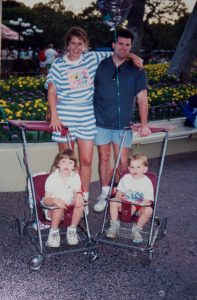By Kim Sanderson
Paul and I raised two children. Ashley, our oldest is hearing, in her 30’s, married to Kris and raising three step-children. Ashley and Kris just welcomed their first son together, Logan, this year. Cole is profoundly deaf, also in his 30’s. He’s married to Caitie, a Teacher of the Deaf, and they welcomed their first son, Beckett, who is hearing, last year. Beckett is now signing up a storm and bringing me back to the days we parented his dad. It seems like only yesterday we were at the beginning of our parenting journey – but now we are lucky enough to be enjoying grandparenthood.
I was asked to share some observations from my 30+ years of parenting both a hearing and Deaf child. I am NO EXPERT and I’ve made my good share of mistakes, but if you’re heading down a similar road now, having had a good head start, I hope my experiences may smooth your path.
Help your child build strong peer relationships & develop a sense of belonging
I think this is one of the most critically important skills any person can master. However, when your child is deaf it can take more effort to develop strong peer relationships and to gain a strong sense of belonging. In our case, achieving this meant a lot of driving!
We were lucky – Cole was born in 1988 –a year there were a number of deaf children of similar ages born in Metro Vancouver. But this meant in order to get together we drove, and drove and drove all over the Lower Mainland. We drove him to school every day from South Surrey to Burnaby (K-9), we drove to sleepovers, sports, summer camps and birthday parties. We drove so much so Cole could attend and feel truly one of the gang when he was with his deaf friends. We weren’t alone in this department – other parents of those kids drove equally as much!

Paul and I were both self employed so we organized and coached sports, we created deaf basketball and baseball teams, and our house welcomed endless sleepovers to ease the burden on other parents driving so much for practices.
In the end, Cole built friendships with a group of deaf peers that far exceeds anything I’ve ever accomplished with friends. To this day, these kids are extremely tight. They truly understand each other’s challenges and successes, and they care deeply about each other. Most importantly, they share a first language and an ease of familiarity and shared history.
It is equally important for siblings to find a place where they belong when they have a deaf member in their family. Our hearing daughter Ashley was introduced to a group of siblings of deaf children similar to herself. Only that group can truly understand the complexities of having a brother or sister who is deaf. They can commiserate about the sacrifices a sibling makes, share a “secret language”, and offer one another a safe place to express frustrations without feeling judged.
Trust me, this isn’t just for your children. It is so important for you as a parent as well. No other mom can truly understand what it feels like to watch our child be excluded or misunderstood like another “deaf mom” can. There is no need to interpret your child’s conversations (which can be exhausting!) when you are all together. I penned the phrase “deaf mom” long ago to mean my group of mom friends, all of who are hearing and mothers of deaf children. For almost 30 years, we’ve gotten together for wine nights, and dinners, we’ve sat on school committees, attended Hornby Island Family Deaf Camp and other family camps and shared the joys of weddings and the grief of funerals. These women are so important to me – both while my children were young, and now as well.
So my strongest advice to you is to go out of your way now to find and nurture these relationships at the beginning of your journey. It will take work, sacrifices and compromises (and lots of driving!) but it truly will provide dividends for all of your life.
Don’t project your crap onto your kids!
This is something that pertains to all your children. I have had the privilege of many years of therapy, with an amazing therapist. Sadly, a lot of my baggage seemed to manifest about the time I started parenting. Luckily I recognized that if I was going to overcome the struggles I faced growing up and be the best parent I could be, I needed counseling.
I remember one example where something I learned at therapy greatly benefited my experience as a mom. I had taken both children to a Christmas concert at a local theatre. Cole was about two – and a rambunctious, athletic boy! Ashley was three and loved dress-up, singing and theatre. While waiting in line, someone in the theatre company noticed Cole was deaf. They came up to talk and focused solely on Cole, which happened far too often. They exclaimed, “I know the signs for “We wish you a merry Christmas” and when we perform that song tonight, I’ll sign it on stage!” Quite an honour I thought!
During the performance Ashley was mesmerized and delighted. Cole, not so much so! He climbed over and under the seats, vocalized loudly, and was bored out of his mind. Feeling humiliated, I removed them from the theatre and scrambled home before we could see them perform the song with sign language. During the entire drive I sobbed. “Poor Cole. He missed out on that performance and will miss out on so much in life. How sad his life will be – as a deaf child – excluded and isolated.” It was overwhelmingly devastating to me.
During my next counseling session, I recapped the experience and my feelings. My therapist asked, “Did Cole look sad during the performance’? “Did he look like he was missing out”? I replied, “No, he looked bored.” She responded, “Do you think you could have possibly been projecting those feelings onto him and this situation? It sounds like he a typical boy, that isn’t too keen on theatre and singing, and was bored.” This was completely true! He wasn’t sad and lonely and left out. Right there and then I thought “Be careful Kim, be very, very careful not to project my feelings of sadness or loneliness growing up, or any other feelings that are mine, onto my children.” This was a GREAT lesson, one I’ve used so often!
Our children will have enough of their own baggage to carry around without piling on our old stuff too!
Reject pity
One thing you may experience is other people’s pity for your deaf child. It comes in many shapes and forms, and I would encourage you to annihilate it when it rears its head! Pity isn’t going to be of any benefit to anyone on this journey. So often, people think they are being nice or helpful by pitying your child. In my opinion, if you want to raise a successful person, communicate strongly there is no need for them to grow up believing they are deserving of pity. They simply can’t hear – period!
Long ago, I took Ashley and Cole to the corner store/gas station. I gave them each a loonie to get a treat while I put gas in the car. They each came out with treats and Cole was proudly holding an extra loonie. Ashley informed me that a man inside gave Cole a loonie – and didn’t give her any!! My blood was boiling. Cole stubbornly turned over his money, and I marched over to the man’s car and signed and voiced, “Did you give my son $1?” He smiled and said, “Yes”, proud of his recognized “compassion”. I handed it back to him and said, “How would you feel if I gave one of your children money? Don’t give my son money please.” The man was now embarrassed. I ensured that both my children could view this entire exchange. What message does it give Cole to expect handouts? What message does it give his sister? Neither of them require handouts – then or now in life.
Forgive yourself for your mistakes
You will make mistakes, possibly some big ones, some public ones perhaps. Some will haunt you for years. Others will cause you embarrassment. This is true of all parenting, but it is magnified when you are entering an area that isn’t familiar such as deafness or hearing loss.
I made many mistakes. My biggest mistake is that our hearing daughter, to this day, feels as though she got “less than” our deaf son growing up. She felt scarred. I knew it was an issue faced by the siblings of children with a difference – that the focus on one child could negatively impact the other. I was aware and I thought I had it under control. I was trying my best. But when Ashley was in her late teens, she started to verbalize how angry she was. She felt second to Cole, she felt she didn’t fit in our family. She angrily shared her painful experiences and expressed her negative feelings towards all of us, but in honesty, mostly towards me.
Parenting is the most important thing in my life. I really wanted to do a great job and it hurts deeply to know that I didn’t do as good a job as I should have or thought I was doing. It took me a long time to admit to myself and to her that I made mistakes and that I’m so very sorry she didn’t get what she needed from us – that her sense of self and belonging was impaired. Through much listening and many discussions, things have improved – but I do believe Ashley will live with some scars. Today Ashley and I are extremely close – I can’t go back and change the past, but I can ensure that my grandbabies feel equally loved. In the words of Maya Angelou “When you know better, do better.” I believe I now know better.
Although it may not feel like it every day, you are entering a really special and memorable time of your life – having a deaf or hard of hearing child is truly going to enrich your experience. I hope there are slivers in this article that will help you on your journey. Parenting is something I consider the biggest privilege and honor of a person’s life and there is nothing I have enjoyed more. MOST IMPORTANTLY – Do take time to cherish your children, all your children. Don’t panic and don’t worry too much. It honestly is going to turn out great. In fact, it just might be amazing!


